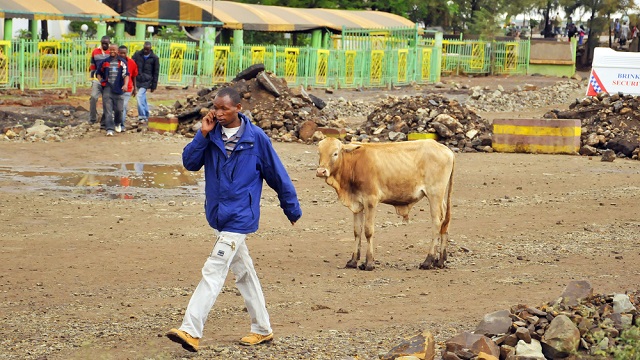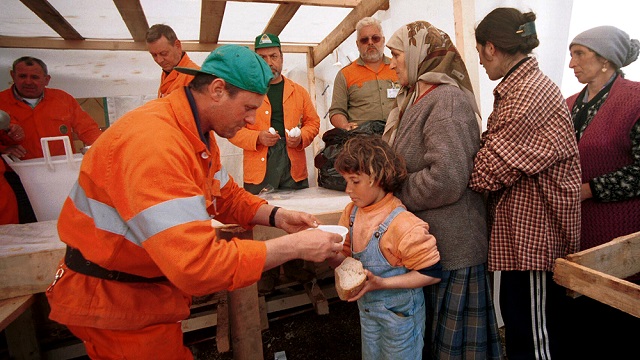Kecia Lynn
Kecia Lynn has worked as a technical writer, editor, software developer, arts administrator, summer camp director, and television host. A graduate of Case Western Reserve University and the Iowa Writers' Workshop, she is currently living in Iowa City and working on her first novel.
The project, called RoomE, uses off-the-shelf hardware and custom-designed software to create an environment in which the computer is always watching and responds to both voice and gesture commands.
A San Francisco-based company is planning to ship its super-thin, polymer-based haptic keyboard to manufacturers next year. It offers the sensation, and even the sound, of pressing keys.
A team of researchers has figured out a way to use nanotechnology to create images at the highest dots-per-inch resolution possible. Such images could be used for anti-counterfeiting or high-density data encoding.
Coming to a highway near you, sometime in the next decade: Large trucks, traveling single-file, separated from each other by a mere few meters, controlled only by the driver in front.
Researchers turned to an old Balkan folk remedy to create synthetic surfaces that employ tiny hair-like fibers to trap the insects.
The report, presented at a meeting of the American Chemical Society, follows studies warning of the presence of arsenic and possibly other heavy metals.
Nuclear engineering student Russell Goff thinks so…and he’s just formed a company to turn spent fuel rods into components to be used in a safe sterilization facility.
According to a new study published in this week’s Nature, icy particles inside the rings erode into the upper atmosphere and eventually form rain water that falls on parts of the planet.
Scientists are getting closer to understanding how “dark lightning” produces bursts of gamma rays that may come in contact with a plane’s passengers and crew.
According to a new study, the frequency and intensity of clear-air turbulence affecting transatlantic flights will increase significantly by 2050…and yes, we do have climate change to thank for it.
Not current smartphone users, who already have lots of app options: It’s the estimated 1.5 billion — most of them in the developing world — who are expected to buy their first smartphone in the next four years.
Taking the paywall concept in a different direction, a Dutch news site offers its readers the option to subscribe to an individual journalist’s “channel” for a small fee.
Like many sites, BigThink has a Terms of Use section. If certain members of Congress have their way, an amended Computer Fraud and Abuse Act could make violating those terms a criminal offense.
With the slow death of “appointment television” comes an increasing tendency for spoilers to pop up in unexpected places. Writer Sean T. Collins discusses fans’ and critics’ attempts to preserve the suspense.
As autonomous cars slowly move closer to reality, designers from different disciplines are looking at how they will change the rules of the road, as well as the road itself.
The Belgian founder of five clinics says the poor are most acutely affected by pain and as a result are the ideal candidates for “humanitarian acupuncture.”
A government initiative that originally focused on hotels in certain districts of Ho Chi Minh City has now been expanded to all hotels in an attempt to combat unsafe sexual practices.
City officials installed four ewes in a half-acre field next to the municipal archives building for a mere $335. They will munch on grass, and fertilize the field, until this fall.
More Africans are moving to large cities, and some are bringing their livestock with them, along with an increased risk of disease. Rather than banning the animals entirely, Kenyan officials came up with a different solution.
A UN agency reports that outbound travel spending jumped a whopping 40 percent last year, putting the Chinese far ahead of both Germans and Americans.
Mobile phone technology built into the bracelet can send alerts if the worker is in trouble. Additionally, people can sign up to keep watch over individual workers through social media.
A paper published Thursday describes the use of carbon dating to determine the precise age of plants uncovered beneath a retreating Peruvian ice sheet at different points in time. The results demonstrate the speed at which the sheet is disappearing.
In Poynton, a shared-space concept has resulted in a revitalized village center where all manner of traffic — gas-powered, human-powered, and anything in between — is treated with respect.
Survey data from a new report indicates that 48 percent of unmarried women between ages 15-44 live with a significant other, a 13 percent jump from 1995. Such couples are also staying together longer before either marrying or breaking up.
Writer David Meyer hones in on what this crypto-currency experiment — regardless of whether it succeeds or fails — could mean for the future. According to him, “The genie is out of the bottle.”
Helmet cams are great when they’re not going through the smoke and haze typically associated with burning buildings. Sensors built into this helmet warn its wearer of objects through vibrations.
Among several companies that have announced plans to bring 3D scanning to the masses is Toronto-based Matterform, which is offering a portable device for less than the cost of some tablets.
Greg Dash made his lo-fi digital fisheye camera by hand, omitting the viewscreen so that users can experience the surprise and discovery of film photography.
Inspired by the unique structure of the Blue Morpho’s iridescent wings, a Vancouver-based company has created an anti-counterfeiting technology that leaps several steps ahead of holography.
Created by engineering students, the Society Harnessing Equipment (SHE) will literally “shock” an assailant and send a text message alert to authorities or family.





























